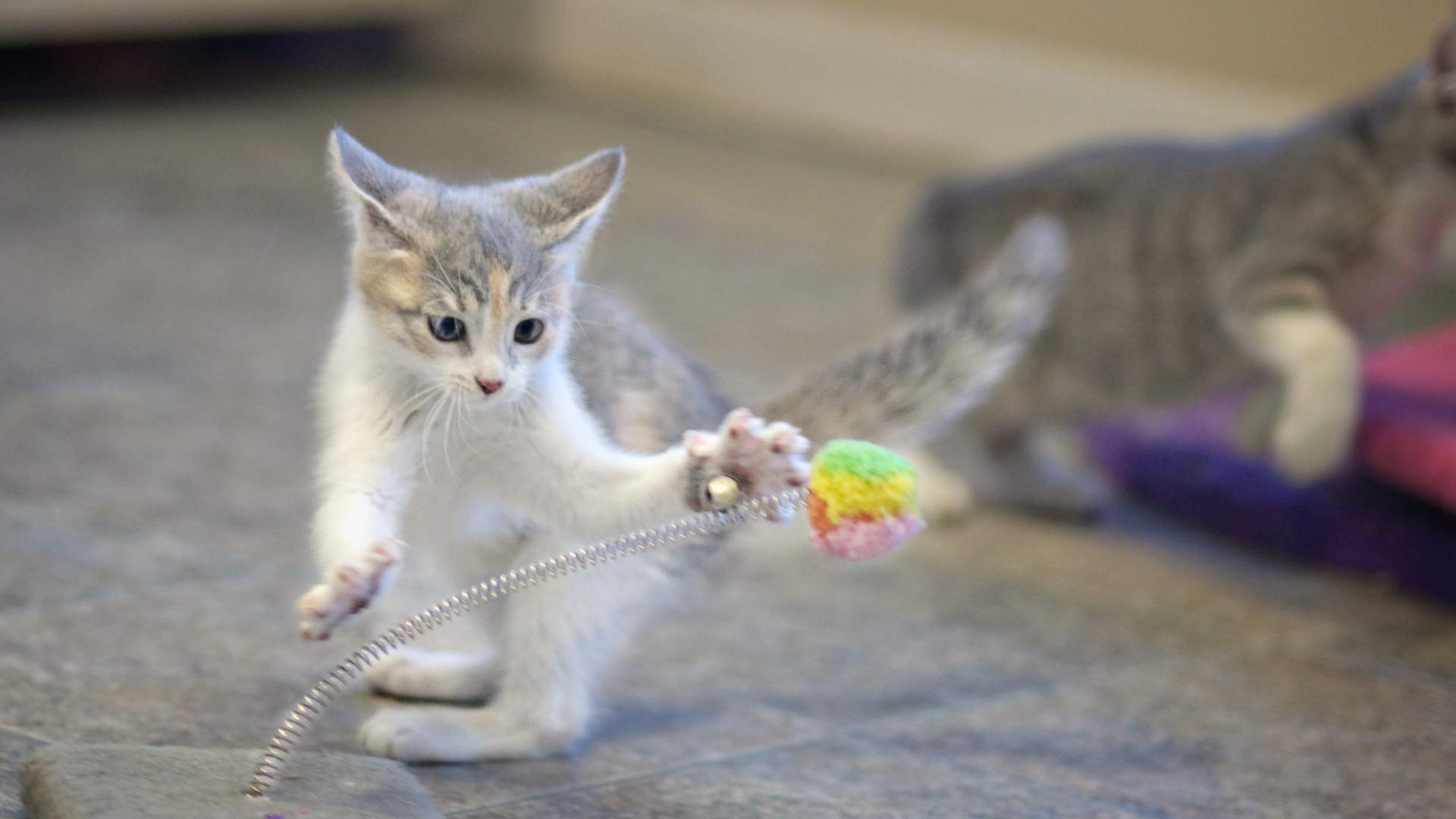How long do cats live? A vet shares five tips to give them a long life
We asked a vet, ‘How long do cats live?’ The answer will surprise you.

Get the best advice, tips and top tech for your beloved Pets
You are now subscribed
Your newsletter sign-up was successful
How long do cats live? We wish the answer were ‘forever’, but sadly that’s not the case. If you’re thinking about bringing home a kitten or already have a fur friend, you’re probably curious as to how much special time you have with them.
The good news is that cats are living longer than they ever have, due to advances in medical treatment, better care, and proper nutrition. By feeding them the best cat food and ensuring they get enough exercise, you can help your feline to live a longer and happier life.
According to a study in the Journal of Feline Medicine and Surgery, the most common causes of cat death are trauma, viral disorder, respiratory disorder, kidney disease, and urinary disorder.
Below, we’ve explained how long cats live and the breeds that live the longest. We’ve also shared how to help your cat live longer, according to expert vet Dr. Joanna Woodnutt.
How long do cats live in human years?
This depends on various factors like their breed, health, and environment, but the average life expectancy of a crossbreed cat is around 14 years. In comparison, purebred cats live shorter lives with an average of 12.5 years.
However, it’s not unheard of for cats to live for 18 to 20 years. In fact, the longest-living cat named Crème Puff lived to 38 years and three days, according to the Guinness Book of World Records.
Which cat breeds live the longest?
According to a study in the Journal of Feline Medicine and Surgery, these are the breeds that live the longest on average:
Get the best advice, tips and top tech for your beloved Pets
Birman - 16.1 years
Burmese - 14.3 years
Siamese - 14.2 years
Persian - 14.1 years
Crossbred - 14 years
British shorthair - 11.8 years
Maine Coon - 11 years
Ragdoll - 10.1 years
Abyssinian - 10 years
Bengal - 7.3 years

How can I help my cat live longer?
If you’ve just brought home a kitten, you might be amazed to think that this ball of fluff could be with you for at least 15 years! But how can you help a cat to live longer? Firstly, it’s important not to be swayed by some of the things you read on the internet. A lot of people will try to sell you some miracle cure that extends life, or will tell you that a particular diet will help your cat live longer. It’s best to remain sceptical about these claims.
Anecdotal evidence (‘my cat took this and lived for 25 years’) is persuasive, but there’s no way of knowing if the medication or supplement truly caused the increase in lifespan without some serious clinical trials. If it sounds too good to be true, it probably is!
On the other hand, studies have shown some similarities between cats that have a long life. Looking at these, we can come up with some recommendations for how to help your cat live longer.
1. Consider keeping them indoors
The leading cause of death for cats of any age is trauma. This is usually due to a car accident, but could also be due to being mauled by other animals, falls from a height, and other accidents. Keeping your cat indoors can help to avoid all of these, and is something to consider. If you can't decide, this feature compares the pros and cons to indoor vs outdoor cats.
However, we also know that keeping cats indoors makes them more prone to obesity, which has a negative impact on lifespan, so it’s a bit of a balancing act. Supervised outdoor access, or using the best outdoor cat enclosure, may be a good compromise along with the best toys for indoor cats.

2. Keep them slim
It’s a well-known fact that obesity increases the risk for lots of diseases, so it’s perhaps not surprising that it reduces life expectancy, too. Obese cats are more prone to diabetes, arthritis, and urinary issues, all of which may result in euthanasia or death.
Understanding your cat’s ideal body shape or ‘Body Condition Score’ and feeding him accordingly is the best way to ensure your cat remains at a healthy weight throughout his life. Cats are prone to losing weight as they reach old age, so keeping an eye out for your cat becoming underweight is important, too! Read our vet's guide on healthy weight loss for cats for more advice.
If you're questioning, 'Is my cat overweight?' this feature can help.
Cat Dancer Products Rainbow Cat Charmer
If you’ve got an indoor cat, this teaser toy is a great way to keep them active. They’ll have hours of fun chasing after the colorful ribbon and it’s a great way to bond with them too. Our tester Allie said it’s her cat’s new favorite, so we voted it as the best runner-up indoor cat toy in our guide.
3. Get them neutered
Studies have shown that neutered cats live longer than unneutered cats, whether male or female. This is despite the fact that neutering increases the risk for obesity. At the moment, we aren’t sure whether this is because:
- Neutered cats are less likely to roam (and so, less likely to be hit by cars)
- Neutered cats are less likely to fight, so there’s a reduced risk of diseases (such as FeLV and FIV
- Neutered cats are less likely to spray, reducing the chance of them being surrendered
- Neutered cats are protected from diseases like mammary cancer and pyometra
- Or whether neutered cats live longer because owners than get their cats neutered are likely to practice other responsible behaviours, like vaccination
It’s likely to be a combination of all of these things. Whatever the reason, it’s pretty clear that neutering your pet makes them more likely to live a long and happy life. Your vet can discuss your cat’s individual risks and benefits, but most cats should be neutered around 6 months of age.

4. Keep up to date with preventatives
It goes without saying that keeping your pet’s preventative treatments up to date reduces the chance of him or her picking up any serious illnesses. Whilst feline panleukopenia (feline parvovirus) is regularly fatal to young cats, another one to be careful to keep up to date with is the Feline Leukemia Virus (FeLV) vaccination. FeLV causes a range of problems, including anaemia, digestive disorders, and cancer. Luckily, the vaccination has been shown to improve life expectancy. Don’t forget that, depending on your region, other preventatives can be lifesaving too!
5. Visit the vet regularly, especially in your cat’s senior years
Regular visits to the vet increase the chance of picking up diseases sooner, making them easier to treat and limiting their impact on your cat. For instance, high blood pressure, a common condition in older cats, can damage organs – the sooner it’s brought under control, the better for your cat – and bad dental disease can increase the risk of heart and kidney diseases.
Whilst you’re there, don’t forget to ask about your cat’s weight. As vets we see obese pets daily, and sometimes we get tired of reminding people that their pet is overweight – we learn to ‘pick our battles’! If you ask about your cat’s weight, it indicates you’re interested in having the conversation and encourages your vet to discuss this with you!
Visiting the vet every 6 months is sensible in senior cats. Your vet might even offer a ‘geriatric clinic’ with the nurses, which is a great way to keep popping into the practice without racking up a large bill. The nurse will check your cat over, and refer to the vet if they find a problem.
Domestic cats in the UK and US live, on average, for around 14 years. But they can live much longer, and any vet you speak to will have memories of treating cats at 20 or 25 years of age! With longer lifespans, diseases are more common, so taking good care of your cat and regularly getting them checked at the vet can go a long way to making those senior years as comfortable as possible.
You might also want to read: How to cat-proof your home and 32 tips for taking care of senior cats.

Dr. Joanna Woodnutt is an experienced vet who graduated from the University of Nottingham. She started writing about pet health in 2017, realizing that it meant she could help even more pet parents.
After graduating as a vet from the University of Nottingham in 2016, Dr. Joanna Woodnutt went on to practice companion animal medicine in the Midlands. She quickly developed a love of consulting and helping clients with medical problems such as dermatology, behavior and nutrition - anything that involved helping clients understand their pets better.
Jo started writing about pet health in 2017, realizing that it meant she could help even more pet parents. Since then, she has written for countless online and print publications and is a regular contributor for Edition Dog Magazine. Jo is the director of The Veterinary Content Company, which she founded in 2020. She is also the founder of Petlearnia, a platform that provides pet e-learning courses for pet parents.
Jo now lives in the Channel Islands with her husband Ian and terrier Pixie.
- Megan MilsteadStaff Writer

